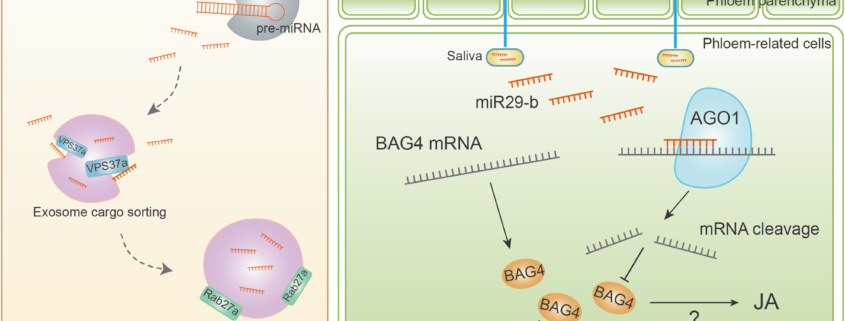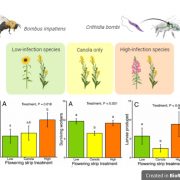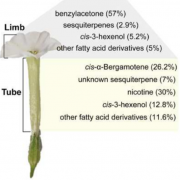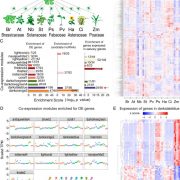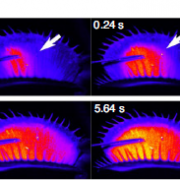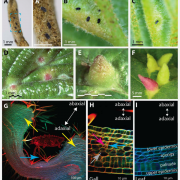Double attack! Herbivore insects feed on plants and silence their genes
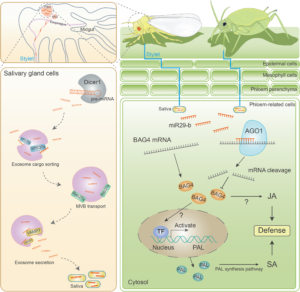 In the natural environment, plants are constantly attacked by animals. Plant immunity is regulated by a network of genes and hormones including salicylic acid (SA) and jasmonic acid (JA). A recent study suggests that herbivore insects threaten plants with concerns more than the bite. Han et al., found that the phloem-feeding whitefly (Bemisa tabaci) transfers miRNA BtmiR29-b to tobacco phloem sap during feeding. The miRNA suppresses plant defense by silencing the defense gene BAG4 and inhibits SA and JA accumulations in the host. Searching through the miRNA database miRBase, the authors found that miR29-b exists in many other insect species of various orders including Hemiptera, Coleoptera, Hymenoptera, Orthoptera, and Blattaria. Besides whitefly, miR29-b was experimentally detected in the salivary gland and saliva of aphid (Myzus persicae), which could transfer the miRNA to tobacco phloem sap during feeding. In plants, BAG4 homologs exist in various species of different families including Solanaceae, Brassicaceae, Cucurbitaceae, Euphorbiaceae, Leguminosae, and Malvaceae. Despite the different target sites, the targeting of the homologous BAG4 transcripts by miR29-b could be predicted. The transfer of BtmiR29-b from whiteflies to Arabidopsis, cotton, and tomato was also experimentally validated. The study demonstrates cross-kingdom miRNA-mediated gene silencing and suggests the conserved mechanism in different species. The findings motivate future studies in other cross-kingdom gene regulations and provide insights into pest control strategies. (Summary by Yee-Shan Ku @YeeShanKu1) Molecular Plant 10.1016/j.molp.2025.01.001
In the natural environment, plants are constantly attacked by animals. Plant immunity is regulated by a network of genes and hormones including salicylic acid (SA) and jasmonic acid (JA). A recent study suggests that herbivore insects threaten plants with concerns more than the bite. Han et al., found that the phloem-feeding whitefly (Bemisa tabaci) transfers miRNA BtmiR29-b to tobacco phloem sap during feeding. The miRNA suppresses plant defense by silencing the defense gene BAG4 and inhibits SA and JA accumulations in the host. Searching through the miRNA database miRBase, the authors found that miR29-b exists in many other insect species of various orders including Hemiptera, Coleoptera, Hymenoptera, Orthoptera, and Blattaria. Besides whitefly, miR29-b was experimentally detected in the salivary gland and saliva of aphid (Myzus persicae), which could transfer the miRNA to tobacco phloem sap during feeding. In plants, BAG4 homologs exist in various species of different families including Solanaceae, Brassicaceae, Cucurbitaceae, Euphorbiaceae, Leguminosae, and Malvaceae. Despite the different target sites, the targeting of the homologous BAG4 transcripts by miR29-b could be predicted. The transfer of BtmiR29-b from whiteflies to Arabidopsis, cotton, and tomato was also experimentally validated. The study demonstrates cross-kingdom miRNA-mediated gene silencing and suggests the conserved mechanism in different species. The findings motivate future studies in other cross-kingdom gene regulations and provide insights into pest control strategies. (Summary by Yee-Shan Ku @YeeShanKu1) Molecular Plant 10.1016/j.molp.2025.01.001


